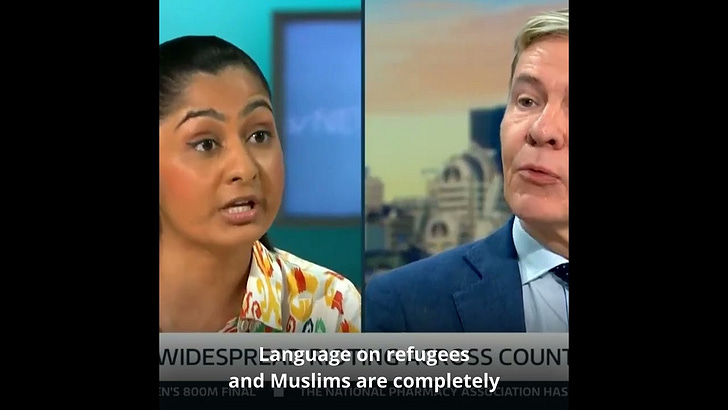Issue #011
Four white people, all middle-aged, discuss the far-right riots and displays of wanton aggression that threatened the UK in the past week with a mild dismay. They are affronted and irate — who were these hooligans that dared to sully the streets of England and Great Britain, that had the audacity to link themselves with such a peaceable and tolerant people? Pertinent questions, certainly, and ones that seemed to issue forth from heads sitting in comfortable bubbles, breathing air a few percentages purer than everyone else's.
And the bubbles would have remained intact had these four not been in the company of a rogue brown woman. Well, perhaps rogue is too strong a word, and the right term would be something akin to token, seeing as they do want her there. They do want to show the onlookers that the odds are in no way stacked against brown people. After all, here is one sitting right there in their very midst, primed to answer questions about being a member of the people targeted in these rage-laced riots that had nothing at all to do with the civilised likes of them four.
But, then, what’s all this! The woman states it is to do with them. She veers off the script dangerously and does not mirror their mild dismay. What is this un-called for attack? Can she not see that they are nothing like that uncivilised mob? How can she insinuate that they are not only in bed with such people, but are their instigators?
What stupidity! It is obvious that if not from a vacuum, that these mobs have acted simply from a place of concern for their country heaving under a titanic load of immigrants! Austerity, language, media outlets, politicians, dehumanisation — utter claptrap! Be reasonable! Why be angry? Why be so mad?
Such was the tone of the scene when Labour MP, Zarah Sultana, joined Good Morning Britain to speak about the race riots that were sparking fear across all of Britain. Visually, there appeared to be a bias from the very outset. While the two white guests were grouped together on one side of the presenters, Ed Balls and Kate Garraway, Zarah Sultana was positioned by herself on the other side. So, without a single word spoken, there was already a sense of her being isolated.
Here’s a clip of the interview for context:
Things only got worse after the conversation started. When Ms Sultana failed to give a stock response, when, instead of pandering to the line of questioning Ed Balls gave her, she began to dismantle the real causes of the fascist hate and violence, the bubbles were popped and the collective gazes of the four white people in the room shifted to defence.
It was clear that they couldn’t fathom her emotional response. In the same twisted narrative that plays out when white people see brown people voice their concerns, feelings and emotions, her words, too, were invalidated. It wasn’t just that they were invalidated despite her being brown, Muslim and a woman, but that the tone adopted was so rank with vulgar supremacy. They couldn’t fathom that an issue that affected her personally would actually… affect her personally. On top of that, they couldn’t contend with the fact that she actually knew what she was talking about. After all, what is more unbelievable than an educated Muslim woman?
Sadly, hers wasn’t an isolated experience. Every woman of colour would recognise what Zarah Sultana must have been feeling in that moment; they would recognise in her experience their own experiences. If misogyny is bad enough for white women, ask any brown woman and she will tell you how humiliating misogyny is for her.
It is almost as if the world still holds to the ‘great chain of being’ and women of colour feature at the bottom. They are the witches, the weaker sex, the temptresses, and also the insidious unknown. It is seen in the presentation of the ‘madwoman in the attic’, principally in the way Jane Eyre’s predecessor, Bertha Mason, stalks Thornfield Hall like an unnatural, beastly creature that must be hidden from view. Her feelings are unfathomable, and far removed from the bounds of human decency.
And the foundations of this prejudice can be found through a little sifting of etymology. When we think of women and their displays of emotions, it is not difficult to end up thinking of hysteria, hysterical, hysterics. All these words can be traced back to the Greek word hystera, which meant womb.
It is almost as if (in English at least) women’s madness is tied to their very biology.
Link this linguistic bias and historical misogyny with systemic white supremacy, and it’s not difficult to see why Zarah Sultana was treated the way she was. A brown woman knowing what she’s talking about? Nonsense!
It is much easier, much more rational to see her instead as an attacker. She must be hiding some form of madness to sound the way she is. A decent person would never raise their voice in that way.
And that’s the way the world turns. Rather than confronting their ingrained biases and the root of the discomfort being felt by themselves and displayed by a brown woman, they hide behind petticoats and call her mad, mad, utterly mad!





It was brave of her to speak up on national television on behalf of Muslims